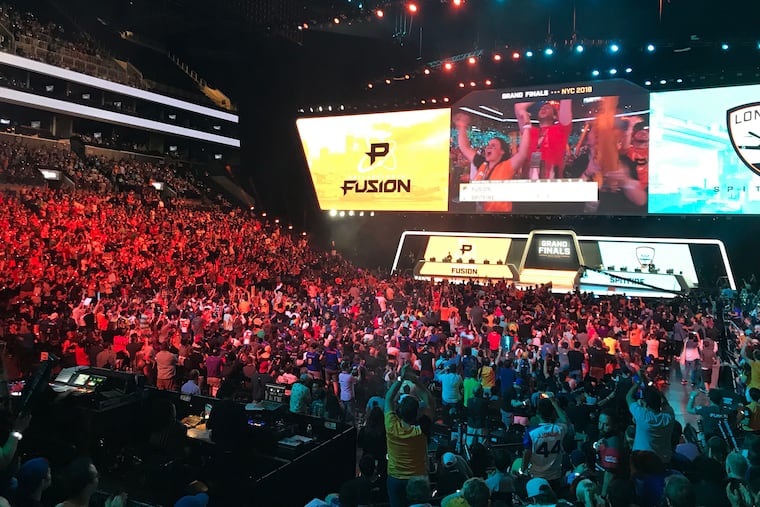Can esports make you more productive at work? IBM, Walmart and others think yes.
Imagine playing 'League of Legends,' 'Valorant' or 'Overwatch' with your co-worker.

Amazon launches a desperate Zerg rush on Facebook. Microsoft crushes Capital One with a well-timed D.Va self-destruct.
Just a typical day in the Corporate Esports Association (CEA), an organization that bills itself as a modern take on the traditional company softball league. But for the employees participating in these matches, esports are more than just fun and games — they’re a form of professional development.
“Imagine playing League of Legends, Valorant or Overwatch with your co-workers,” said Brad Tenenholtz, co-founder of the CEA. All three games he lists are team-based, requiring strategic coordination to achieve a common goal. “You’d better be communicating really well with those colleagues, or you’ll be left in the dust.”
The CEA hosts season-long esports tournaments that pit employees from one company against another’s in what Tenenholtz describes as a unique form of corporate team building. Instead of trust falls and personality tests, colleagues bond while playing such popular games as League of Legends, Rocket League, and Overwatch. And with many Americans working from home as a result of COVID-19, the CEA is enjoying its most successful season yet, with participants from more than 150 different companies including Walmart, IBM, General Motors and Amazon.
"More companies are realizing that competitive gaming is a meaningful activity that provides a very serious value-add," Tenenholtz said.
But how exactly do esports affect office productivity and collaboration? According to a host of gamers working at some of the country’s largest companies, the benefits are surprisingly numerous.
For Michael Flores, a client technical leader at IBM who organized the company’s internal gaming community, esports’ primary professional impact is simple: It shapes how employees view themselves within the context of a team.
“If a League of Legends game doesn’t go so well, you might be quick to think about everything your teammates did wrong versus what you could have done better,” Flores explained. “For many of my colleagues, they start to realize over time: ‘How can I empower others instead of just think about myself?’ They start to appreciate each other’s individual skills and think of how to maximize that.”
Flores established IBM's esports group about seven years ago as a way to meet new colleagues and explore the intersection of gaming and work. He faced little resistance from IBM's corporate offices when he approached them about it. "Maybe I helped certain people think about esports and gaming in a way they never had before," he said.
IBM now has more than 500 members in its esports community, with some competing in CEA and others playing more informally. For junior IBM employees such as software engineer Alek Mieczkowski, who began working at the company shortly before the pandemic, IBM esports have been particularly helpful for networking and cross-team collaboration.
“Especially during COVID, the connections I’ve made have been really important,” Mieczkowski said. Although he is working at home from North Carolina, he forged a close friendship with a colleague based in Ontario, Canada, through IBM’s Valorant team. “Now we talk almost every day,” he said, “and this never would have happened without our gaming community.”
Joshua Rowell, a product manager at Walmart and one of the company's esports leaders, says that competitive gaming can be a powerful tool to enhance workplace communications.
“I’ve seen people spend more than 30 minutes drafting a simple work email,” Rowell said. “But when you’re in the middle of playing Overwatch or League of Legends, you don’t have time to sit back and think, ‘Hmm, am I being too flowery with this message?’ So esports actually teaches you to be respectful while still being concise.”
Rowell established Walmart's internal esports presence about five years ago, thanks in part to the support of the company's then CIO. It has grown to include more than 700 employees spread across corporate headquarters and distribution center warehouses.
Outside of personal communications, Rowell notes that esports also serve as a useful way to identify potential managers and discover leadership qualities lurking in employees who don’t necessarily see that potential in themselves. In fact, Rowell has recommended some employees for promotion based partly on the skills they’ve exhibited as esports captains.
"These individuals were great at directing people in a game, but they never thought to apply those same principles to their jobs," he said. "We were able to reach out and show them how they can carry those skills over to their day-to-day."
For Denise Rousseau, a professor of organizational behavior at Carnegie Mellon University and a longtime management consultant, the question is not so much whether esports will be used for team building but whether it will be used correctly.
"Right now, companies are using this to promote team cohesion, which is a superficial but not unimportant goal," she explained. "There is very clear research, though, that states it's not so much the exercise itself, but the reflection afterward that creates real learning."
Rousseau suggests that for esports to truly catch on as a valuable professional development tool, companies should eventually start providing debriefing materials for colleagues to lead reflections after matches, to discuss what they learned about problem solving, collaboration, and their own weaknesses. "If you want people to truly act and think differently as a result of this, reflection is critical," she said.
As for the current crop of esports corporate evangelists, the next priority is to make workplace gaming — whether formally through CEA or otherwise — more accessible for more employees.
“The reason trust falls are a classic example is because they’re universal,” IBM’s Flores said. “So how do we engage with folks who are open to this idea but don’t necessarily know every Call of Duty load-out as much as some of us? ... That’s where a lot of our work is being done internally.”